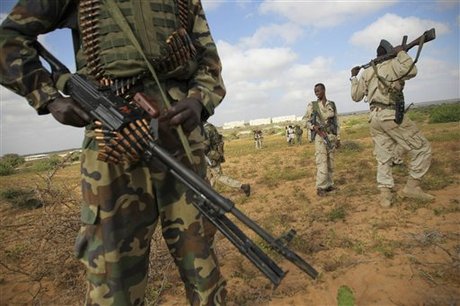
Britain recently hosted an international conference on Somalia pledging more aid, financial help and measures to tackle terrorism. The Western world consider Somalia a failed state always in the midst of a civil war between competing actors, first tribal warlords, then between secular and Islamic factions and now between moderate Islamists under Sheikh Sharif Ahmed and the more radical elements within Al Shabab.
The international conference held in London takes place after numerous conferences of similar nature have taken place since the America intervened in the country in 1993. All of them have had the same end result, more money to foreign backed governments all ending in failure.
It should be remembered that the conference in London took place in the following context: The US, the world superpower has failed to achieve victory in Somalia. The US army failed miserably during its invasion of Somalia in 1993. They were defeated within 18 months and left the country humiliated. Not content with this defeat Ethiopia fought a proxy war in Somalia on behalf of the US but it also failed to achieve any sustainable victory.
Subsequent to this the US has focussed on political and diplomatic efforts and invested in negotiations in the hope of achieving victory in Somalia.
Somalia: Past and Present
The Horn of Africa region has suffered from a tumultuous history. In 1884, Europe agreed on the invasion, occupation, colonisation and annexation of Africa. Britain, France and Italy all laid claims to various parts of the area now known as Somalia. For 40 years, Britain controlled northern Somalia because of its access to the Red Sea, and the Italians ruled southern Somalia whilst the French controlled neighbouring Djibouti.
Both British and Italian territories gained “independence” in 1960 and merged to form modern-day Somalia. Somalia’s sitting president was assassinated in a military coup in 1969; just 9 years after the Europeans left.
Muhammad Siad Barre became Somalia’s new president in 1969 and founded Barre’s Supreme Revolutionary Council as the sole political party in Somalia.
In 1991, Mohamed Siad Barre was ousted from power, and a power struggle ensued between clan warlords. America used this instability as an excuse to deploy approximately 30,000 troops in Somalia. The mission was a failure and it resulted in a humiliating withdrawal for the US.
Today Somalia has seen almost two decades of chaos and conflict. It had started to enjoy some stability in the 2006 when the Union of Islamic Courts (UIC) took control of Mogadishu and other parts of the south after defeating clan warlords. After years of lawlessness, the UIC worked to bring some law and order based on implementing aspects of the Shari’ah of Allah (swt).
This was a step too far for America who ordered its proxy, Ethiopia, to brutally invade the country to remove the Supreme Islamic Courts Council (SICC), thus leading to over 1 million refugees being displaced due to the fighting.
Somalia Today
Foreign interference has compounded the problems of the Horn of Africa. Although the West has been keen to intervene around the world spending trillions of dollars to wage war while killing thousands of civilian in the process, they have shown wilful neglect in the face of humanitarian disaster in Somalia.
Today the US has engaged other nations to help it in achieving its aims in Somalia. It was in this context the London conference on Somalia took place. British interference in Somalia was exposed by The Observer, which revealed that, away from the public focus of the summit, talks are going on between British officials and Somali counterparts over exploiting oil reserves that have been explored in the arid north-eastern region of the country. Abdulkadir Abdi Hashi, minister for international cooperation in Puntland, north-east Somalia – where the first oil is expected to be extracted next month – said: “We have spoken to a number of UK officials, some have offered to help us with the future management of oil revenues.
Conclusions
Since America’s humiliating withdrawal from the country in 1995, over 14 transitional governments have been constructed in Washington for Somalia and all failed as they have no support in Somalia. Sheikh Sharif Ahmed though on paper is the President of Somalia he is actually the president of his own living room, as his militia barely controls any of the country. Well before the Arab spring the Muslims of Somalia have resisted western colonialism in the face of much adversity such as famine, they have however stood tall and continue to resist the western onslaught as they hatch plans in Western capitals.
